FOF Linda Wolfe, the award-winning author of 10 books and a 12-year veteran of the National Book Critics Circle, picks 2010’s most unforgettable titles. Warm up your Kindle, whip out your library card or just snuggle in bed with a good old-fashioned paper version of one of these works of art.
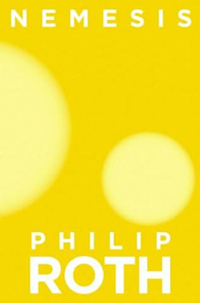
NEMESIS by Philip Roth
292 pp. Houghton Mifflin. $26.
In the sweltering summer of 1944, the year before World War II ended, a polio epidemic spread throughout Newark, New Jersey, [click to read more]
destroying the lives of many young people, some of whom died, some of whom went on to live as lifelong cripples. Roth, in his thirty-second novel, writes vigorously about the effects of the epidemic on one man, Bucky Cantor, a youthful playground director who is viewed as almost godlike by the boys he teaches to play ball, do exercises, throw the javelin. Due to poor eyesight, Bucky has been denied what he most desires: a chance to serve in the war. But when the epidemic strikes he determines to keep to his post in the playground and care for his charges no matter their – and his – fears about polio. His girlfriend implores him to join her in the presumably healthier air of a summer camp, but he refuses. “This was real war, too,” he thinks, “a war upon the children of Newark.”
What happens to Bucky and the children of Newark is brilliantly evoked by Roth. The book is a triumph of style and sensitivity which culminates in a searing inquiry into the nature of God. The last few pages are among the most breathtaking that Roth has ever written.
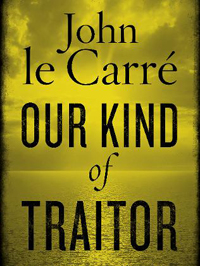
OUR KIND OF TRAITOR by John Le Carré
306 pp. Viking. $27.95
Le Carré, grandmaster of the spy thriller, has written his most suspenseful espionage story in years, [click to read more]
a book about the Russian mafia, international money laundering, stiff-upper-lip British intelligence agents, and two innocents abroad who get dragged–despite their better judgment–into dangerous cloak-and-dagger games. The innocents are Gail Perkins, a young barrister, and her boyfriend, Perry Makepiece, a literature professor and dynamite tennis player. On a much-anticipated Caribbean vacation, they’re approached by an enigmatic Russian bear of a man named Dimitri Krasnov–Dimi for short–who wants to play tennis with Perry. Turns out, he also wants Perry to contact the British government and arrange permanent residence for himself and his family in exchange “for certain informations very important, very urgent, very critical for Great Britain of Her Majesty.” It’s a roller coaster ride from there on in, a tale that will keep you or any of your book-loving friends biting your fingernails and sometimes – how does he do it? – tearing up at the same time.
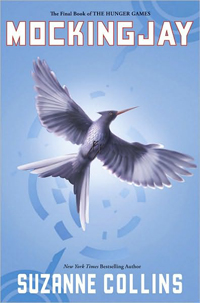
MOCKINGJAY by Suzanne Collins
390 pp. Scholastic Press. $17.99
This is the third and final novel in Collins’ Hunger Games trilogy. If you haven’t
yet read the first two, The Hunger Games and Catching Fire, you’ve been missing some of the most exciting fiction out there [click to read more]
– and even though the books are written for Young Adults, many of us older adults have been passionately devouring them. Not just to have a peek at what our teenagers are reading, but because the books are inventive, fast-paced, ethically provocative, and have an exceptionally charismatic heroine. She’s a moody, spirited sixteen-year-old, and although her adventures take place in a dystopian future society, she’s as true to life, as the girl next door – or in one’s own house. Mockingjay, for those who’ve read the first two books, is less tightly plotted than The Hunger Games, my favorite, but it’s equally compelling.
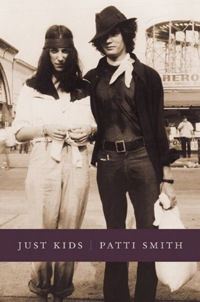
JUST KIDS by Patti Smith
279 pp. Ecco. $27.
She’s been called “the godmother of punk” and “punk rock’s poet laureate,” and it turns out she’s a terrific memoirist. [click to read more]
In Just Kids, Smith writes about being a pregnant nineteen-year-old “country mouse,” giving up her baby, and seeking a new life in the edgy bohemian world of sixties New York. Unsure of who or what she will become, she’s helped along her way by meeting Robert Mapplethorpe, the taboo-defying photographer who will become one of the most controversial artists of his time as well as Patti’s friend and lover. Her memoir is full of carefree moments and encounters with famous figures like Janis Joplin and Andy Warhol, but there’s a heartbreaking quality to the tale as, still “just kids,” Patti and Robert head toward the fame and fortune that will eventually strengthen one and destroy the other.
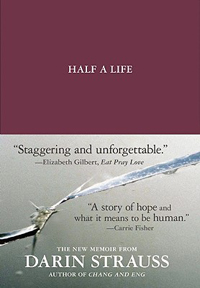
HALF A LIFE by Darin Strauss
205 pp. McSweeney’s. $22
A tiny, compact memoir, this book has all the thrust and power of a car crash, and indeed it’s about a crash [click to read more]
in his senior year of high school, novelist Darin Strauss accidentally ran over a girl on a bike. The girl, a schoolmate of his, died, and in a way, Straus died too. He would never be free from thinking about her, even when doing the most mundane things, like getting a can of soda: “Celine Zilke will never feel a can in her grip,” he’d think, and later, Celine would never go to college, get married, have a child. By the time he himself marries, he has come to feel he’s living for two. He changes from being a crass, book-averse teenager to an academic achiever and a writer of enormous talent. His story is a page-turner and a profound exploration of how we are shaped by, and must live with, the consequences of our actions.
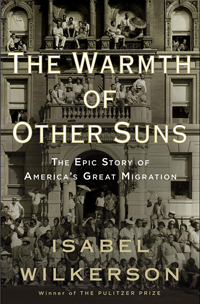
THE WARMTH OF OTHER SUNS by Isabel Wilkerson.
622 pp. Random House. $30.
Starting in the early nineteen-hundreds, black people began leaving the Jim-Crow South in droves and settling down in the North and West. [click to read more]
These immigrants to a new world were not so different from those who fled oppression in Russia, Italy, and other European countries to make better lives for themselves in the freer atmosphere of America. Wilkerson gives us the story of the “epic migration” of blacks, focusing her account on the lives of three fascinating individuals she chose after interviewing more than a thousand people. You’ll learn things about America you never knew before. You’ll come to know her characters intimately (some of them may remind you of the characters in Kathryn Stockett’s The Help). Above all, you’ll be wowed by how readable and absorbing Wilkerson’s important work of history is.
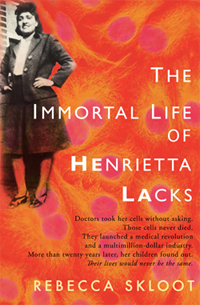
THE IMMORTAL LIFE OF HENRIETTA LACKS by Rebecca Skloot.
369 pp. Crown. $26.
This is that rare thing – a book about science that is engrossing and understandable even to someone like me who got a “D” in biology. [click to read more]
Skloot, a science journalist, spent ten years tracking down the story of a woman who died of cancer in 1951 but whose cells, withdrawn from her cervix during a biopsy, became immortal by virtue of being the first ever reproduced successfully and in profusion in a lab. The woman was Henrietta Lacks, an illiterate mother of five, and the cells–dubbed “HeLa” from the first letters of her first and last names–have been flown to the moon and bought and sold around the world. They have helped with nearly every important advance in medicine: the polio vaccine, chemotherapy, cloning, gene mapping, in vitro fertilization–you name it. But while every science student knows about HeLa cells, virtually no one knew anything much about Henrietta Lacks until Skloot undertook to find out who she was. She tells a whopping good tale about her nervewracking search, and writes with uncommon skill not just about Henrietta and her descendants, but about cell culturing, the interplay between race, poverty and science, the ethics of tissue collection, and the laws that are newly emerging to determine whether our cells belong to science or ourselves.








